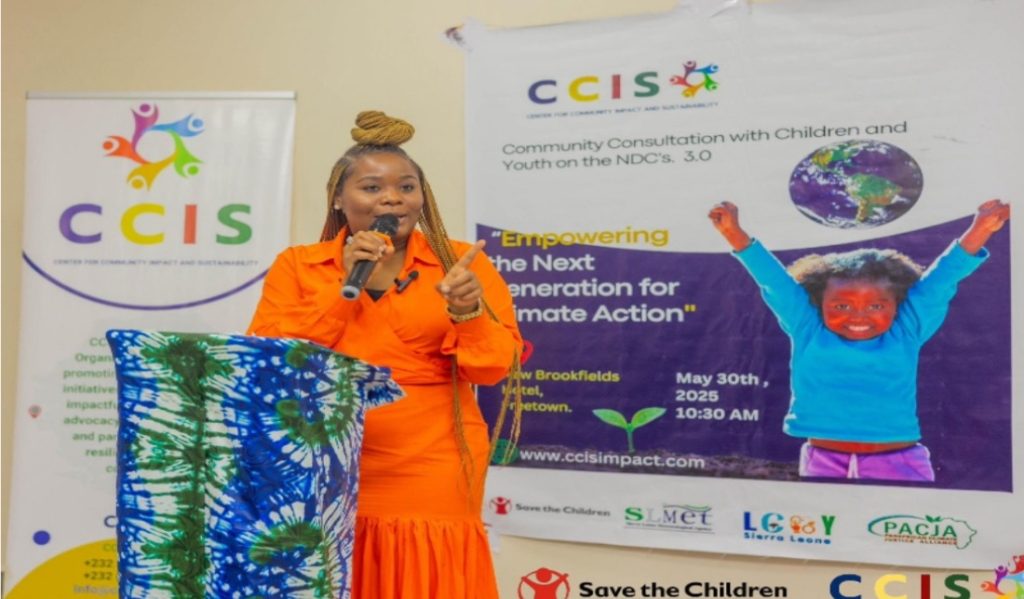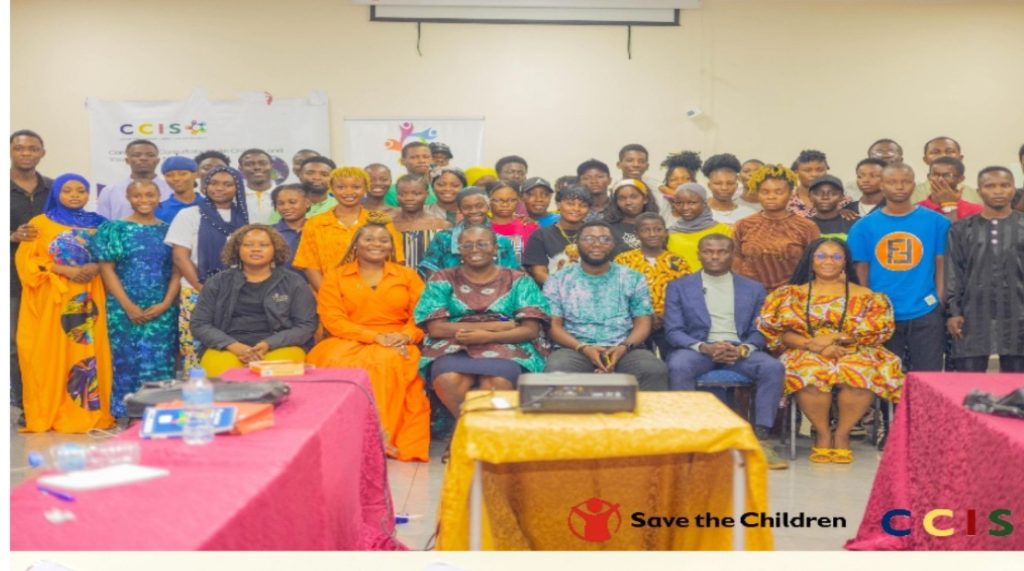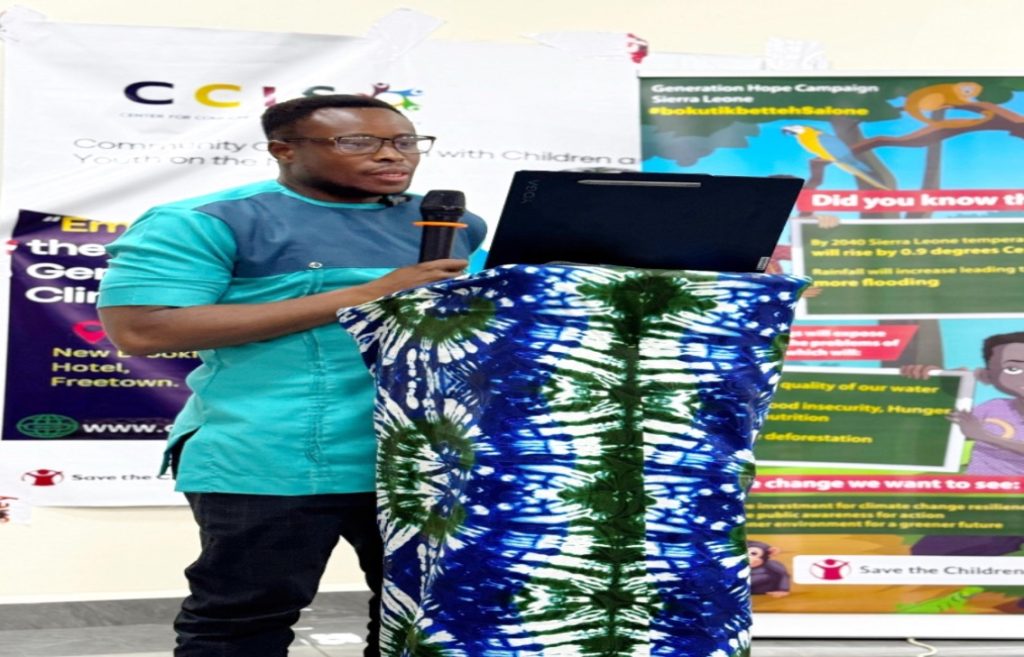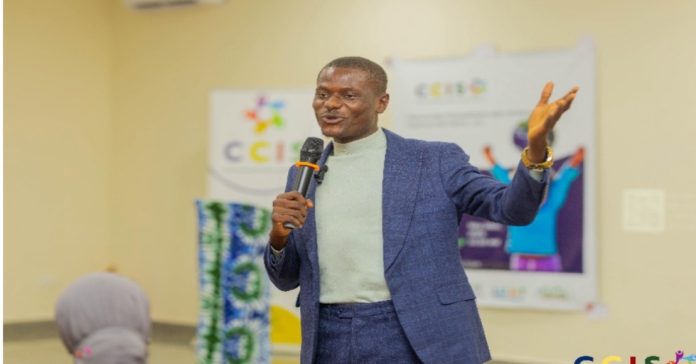Led by the Centre for Community Impact and Sustainability (CCIS) in collaboration with Save the Children, the consultation placed marginalised young voices at the centre of Sierra Leone’s climate commitments under the NDCs process.
By Michael Mark Wilson, Freetown, Sierra Leone
As Sierra Leone prepares to implement its Nationally Determined Contributions (NDCs 3.0) under the Paris Agreement, there is growing recognition of the need to meaningfully involve children and youth in climate action.



Many vulnerable youth face the daily realities of climate change but are often excluded from policy discussions that affect their future. They are rarely consulted, their voices not prioritised, and their solutions overlooked.
In response, CCIS in partnership with Save the Children organized a one day consultation on the NDC’s 3.0 at the New Brookfields Hotel in Freetown, bringing together 50 community children and youth from both Western Rural and Urban area to strengthen their understanding of climate change, empower them to contribute to national climate solutions, and for their voices to be included into the NDCs 3.0.
The workshop was centred on the following key issues
1. To create a safe and inclusive space for children and youth to share their lived experiences with climate change and propose solutions that can inform Sierra Leone’s NDCs 3.0.
2. To build climate literacy and leadership among young participants, enabling them to become active contributors to environmental advocacy and national policy processes.
The Founder and CEO of CCIS, Ms. Lyzianah Emakoua and Convener of Local Conference of Youth (LCOY) Sierra Leone 2025, delivered a rousing mid-day address, underscoring the significance of the consultation as a youth-led roadmap toward the 2nd Edition of LCOY Sierra Leone, set for October.
She highlighted LCOY as a national platform empowering young people to shape climate action locally and influence global processes like COP through YOUNGO, the official youth constituency of the UNFCCC. Ms. Emakoua urged participants to engage boldly, share their experiences, and embrace the space as a powerful moment for youth-driven change.
The Country Director of Communication and Advocacy of Save the Children, Mrs. Esther Nyamu, emphasized the critical role of young people in climate action, noting that their ideas and voices must be reflected in national decisions like the NDCs.
Additionally, she expressed appreciation for the participants’ engagement, highlighting that such inclusive dialogues are key to building a sustainable future. In a related contribution, Mr. Sallieu Kanu, Senior Manager Youth Engagement and Campaigns from C40 Cities Freetown, echoed the urgency of climate responsibility, citing poor waste management as a major threat to health and the environment.
He called on youth participants to support any local and national entities driving sanitation campaigns in their various communities. He stressed that the issues raised would be documented as data-driven inputs to drive funding and support Freetown City Council’s efforts to align with the Paris Agreement.
In an interactive session, Mr. Hassan Hindolo, founder of Ecotourism Hub, broke down complex climate terms into everyday language. Using real-life examples like floods in Waterloo and waste pollution in Freetown, he connected science with lived experiences. He stressed the need for climate advocacy, not just awareness, and encouraged youth to take the lead in demanding their place in decision-making, policy influence and providing solutions.
During his facilitation session, Mr. Henry David Bayoh, Consultant at the Environmental Protection Agency (EPA) and National Coordinator & Focal Point, Pan African Climate Justice Alliance (PACJA), provided an accessible overview of Sierra Leone’s NDCs, explaining their evolution and alignment with the country’s climate and development goals. Furthermore, he emphasised the importance of integrating youth voices into the NDCs 3.0 reporting and validation processes, and additionally outlined practical ways young people can actively shape climate policy.
In particular, stressing that youth and children are a key constituency of the UNFCCC, Mr. Bayoh called for greater awareness and participation. Moreover, noting the lack of sectoral ownership in NDCs 2.0, he advocated for broader, inclusive engagement in the current phase. Participants were divided into breakout sessions to develop children and youth-led recommendations across key thematic areas ranging from Waste Management, Water Sanitation and Hygiene (WASH), and Health to Climate Adaptation (Livelihoods i.e. Clean Cooking) and many more.
These recommendations will be presented to the national NDCs steering committee and national key stakeholders, including: PI-CREF, Ministry of Environment and Climate Change, EPA, SLMET, Ministry of Youth Affairs, Ministry of Children Affairs and more.
Moreover, these recommendations will also form the basis of a sustained advocacy drive within schools and universities over the next 2–3 months to keep the momentum and deepen youth engagement in climate action.

